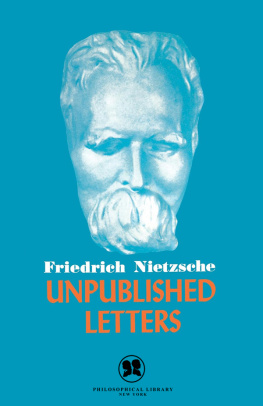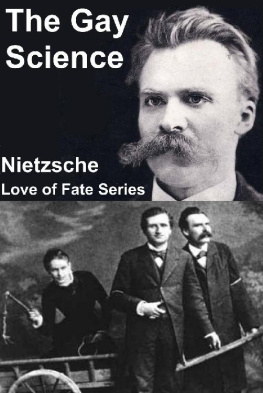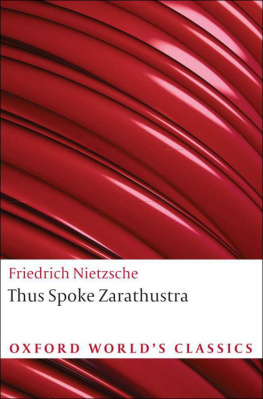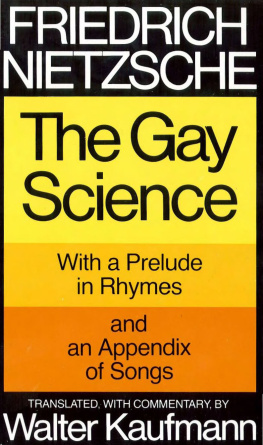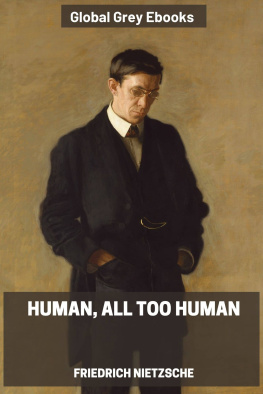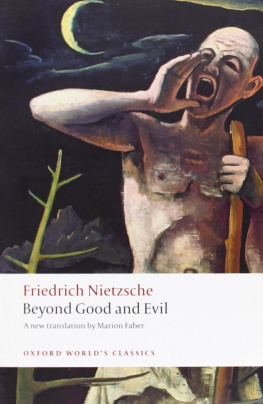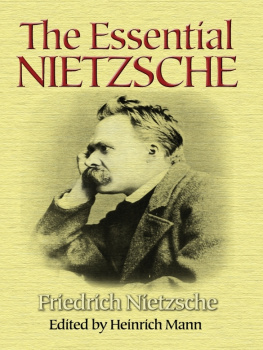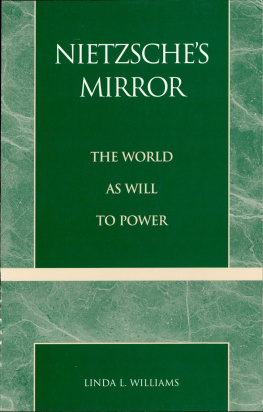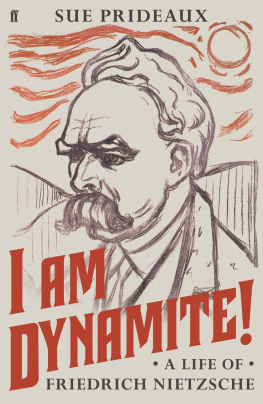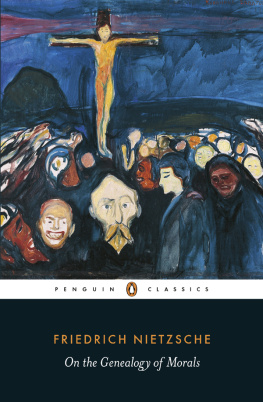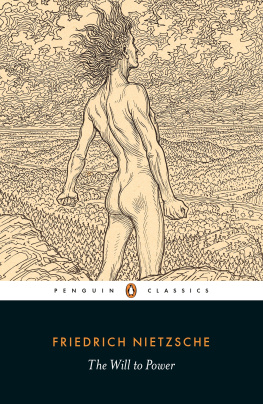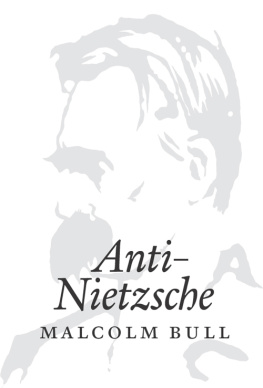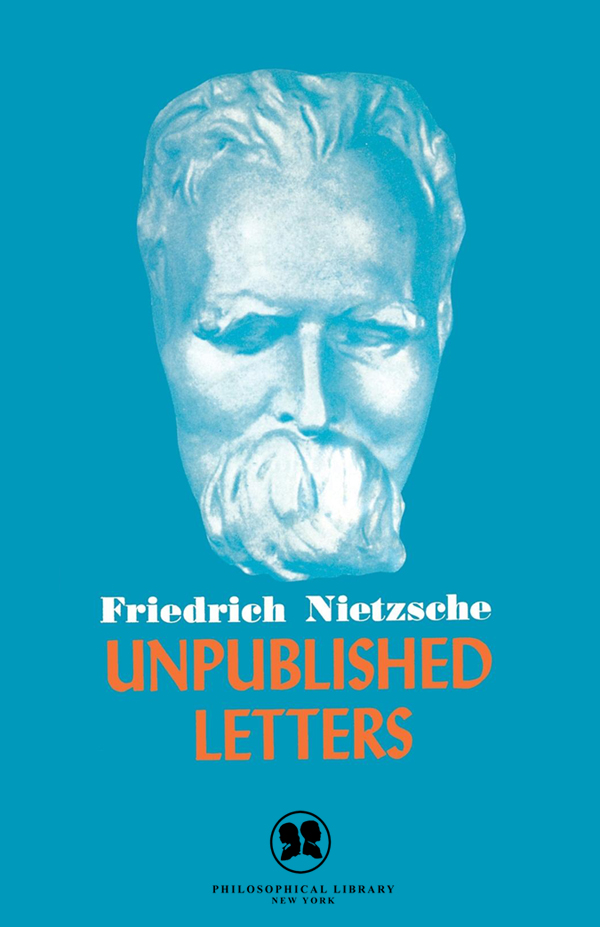THE LETTERS
(1) To Elisabeth Nietzsche
(Pforta, end of November 1861)
From your brother
Dear Liese:Since I owe you a letter for quite some time I shall write you an especially fine one now, provided my clumsy pen will not prevent me. Probably there is nothing with which I can entertain you now except writing ofChristmas. Anyhow, isnt it now our best-loved thought and hasnt it been all these years around this time! Now, then, lean back comfortably and try to recall one of my first evenings of vacation when we were sitting in the warm room with or without lamp light, and each would present the other with a Christmas list. Meanwhile Mamma and aunt Rosalie would engage next door in mysterious doings and
we eavesdrop
when secretly words pass between them;
and a rustling, quite peculiar,
now a whisper, now a crackling,
make us curious for the wonders,
while the ghostlike stirring
and the wafting to and fro
make us tremble etc.
I hope you have not made your list so definitive that I may not at least give you the benefit of a few suggestions. I wrote down quite a number of desirable books and sheets of music and would like to tell you about some. Amongst the latter, for instance, a work by Schumann seems to me to be rather suitable for you, the same Schumann who composed the broken window pane.
I am sure it represents his most beautiful songs in general; it is Frauenliebe und Leben, poems by Chamisso, and should cost around 20 Silbergroschen. The text also is absolutely beautiful. Among books I could recommend, first of all, two works on theology which will interest both you and me very much. I myself heard them praised by Wenkel himself which, I take it, is significant as far as you are concerned. Both works are by Hase, the famous professor who lives in Jena. He is the most keen-witted champion of ideal rationalism, whose lectures I almost came to attend at one time. The Life of Jesus (1.6) is one of the works and Church History (2.6) is the other. Both are or, rather, each singly is 1 Taler and 15 Silbergroschen. Write me if you want to have the correct address. Or would you rather have an English book? If I were in your place I would most decidedly read Byron in English. The book costs 1 Taler and 25 Silbergroschen. I could jot down a number of different books for you. Presently I will give you my list.
Now, as concerns music I like to have Paradies und die Peri by Schumann in the solo arrangement for piano. That is something that delights everybody and would delight you also. Next, Shelleys poetical works translated by Seybt. Schumann costs about 2 Talers if you get it through Gustav, Shelley is 1 Taler and 10 Silbergroschen. I would be beside myself with joy were I given both, for this is all I want.
By the way, I am just reminded of something I have to tell you. Last Sunday noon I was invited to Dr. Heinzes for a meal. The food was very good but the conversation was still more delectable. Moreover, the new teacher, Dr. Volkmann, is prepared to give private lessons in English. Lots of people have applied. As for me, however, I shall join not until Easter. At the moment I am still studying Italian privately, as you know. I am taking Latin, Greek, and Hebrew in which we are reading Genesis. In German we read the Nibelungenlied in the original, in French we read Karl XII in class and Athalie in a group of three, excluding me. In Italian I am reading Dante with a group. If that is not enough for the present, then I do not know, especially since in Latin we are simultaneously reading Virgil, Livius, Cicero and Herodotus.For now farewell and hope you are enjoying this rather long epistle.
Until we meet again on Sunday in Almrich
Your Fritz
(2) To Franziska Nietzsche
(Pforta, probably May 2, 1863)
Dear Mamma:Your dear letter with the caramel for the chest was very much appreciated, especially since you informed me about quite a few things in which, as you know, I am much interested. Let me report, first of all, about my being indisposed. My hoarseness is still present and, to be sure, without relief. Since yesterday I am drinking Seltzer water with milk which seems to be giving me some relief. By and by I am getting the blues in this sickroom, particularly today as the weather is fine and the sky is laughing. Even though I am at work I do not accomplish much because I am lacking one or the other book. I am making extracts from Hettners History of Literature of the Eighteenth Century and, in general, am much occupied with the history of literature.
Concerning my future I am a little disturbed by some very practical considerations. The decision as to what I should specialize in does not come to me out of thin air. I have got to think about it myself and arrive at a choice. It is this choice which bothers me. Certainly it is my endeavor to study thoroughly whatever I am going to study; but the choice is all the more difficult inasmuch as one has to ferret out that field in which one can hope to accomplish something worth-while. And how deceptive do ones expectations turn out quite often! How easy it is to be carried away by some ephemeral preference, or some old family tradition, or by some special desires. Choosing, thus, a profession is much like playing the lottery with its great number of blanks and mighty few hits. Now, I am also in the rather inconvenient position to have really a great number of interests which are distributed over different fields and which, if I were to follow through with all of them, would make me a learned man, but hardly a professional person in the narrow sense. I am clear in my own mind that I must, therefore, slough off a few interests and, by the same token, add a few new ones. However, which are the unlucky ones I shall have to throw overboard? Perhaps they are the very ones that are my favorites!
I cannot speak more plainly. It is evident the situation is critical and I have to arrive at a decision in the coming year. It will not come automatically, and as for me I know too little about the different fields.
Enough of this.Really I have nothing further to write about, except that I am very sorry that I did not get to see the married couple in Pforta.
Give my greetings to Lisbeth and uncle.
The best to you all
Fritz
(3) To Franziska and Elisabeth Nietzsche
(Bonn, October 24 and 25, 1864)
Monday morning
Dear Mamma and Lisbeth:Most courteous bows to the right and to the left: introducing myself to you as a member of the German student fraternity Franconia!
Now, I can see with my minds eye how you people are shaking your heads in a most peculiar manner, giving forth with a cry of astonishment. There are, indeed, many wonderful things connected with this step and, therefore, I shall not blame you. For instance, almost at the same time that I joined the Franconia seven men from Pforta did so and, to be sure, all of them, except two, not only came from Pforta but met in Bonn. Among them are many who are already in their fourth semester. I shall name you some whom you may know: Deussen, Stckert, Haushalter, Tpelmann, Stedefeld, Schleussner, Michael, and myself.
Of course, I gave mature reflection to the step before I took it and have come to the conclusion that in view of what I am it was almost necessary. For the most part we are all philologists and at the same time music lovers. In general, a very interesting spirit is prevailing in the Franconia, and I liked the older men immensely.

